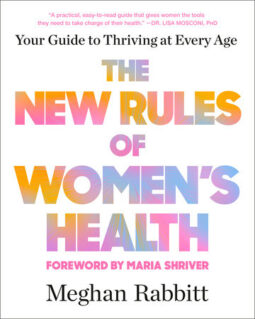 New Rules of Women’s Health (start time: 6:26) If you’re female, you may have come of age reading the landmark feminist health book Our Bodies, Ourselves. Originally published in the 1970s, it yielded several revised editions up to 2011. Well, get ready for an even more comprehensive tome. It’s called The New Rules of Women’s Health: Your Guide to Thriving at Every Age, and it was published last month by Maria Shriver’s The Open Field Imprint of Penguin Random House. It’s part guidebook, part manifesto. In this week’s How On Earth, host Susan Moran interviews the book’s author, journalist/editor Meghan Rabbitt, focusing on how to take charge of your health before, during and after menopause. (We’ll continue our conversation next week with Pt. II, with a focus on brain health research and practices.) Rabbitt is the executive editor of Maria Shriver’s weekly digital newsmagazine, The Sunday Paper.
New Rules of Women’s Health (start time: 6:26) If you’re female, you may have come of age reading the landmark feminist health book Our Bodies, Ourselves. Originally published in the 1970s, it yielded several revised editions up to 2011. Well, get ready for an even more comprehensive tome. It’s called The New Rules of Women’s Health: Your Guide to Thriving at Every Age, and it was published last month by Maria Shriver’s The Open Field Imprint of Penguin Random House. It’s part guidebook, part manifesto. In this week’s How On Earth, host Susan Moran interviews the book’s author, journalist/editor Meghan Rabbitt, focusing on how to take charge of your health before, during and after menopause. (We’ll continue our conversation next week with Pt. II, with a focus on brain health research and practices.) Rabbitt is the executive editor of Maria Shriver’s weekly digital newsmagazine, The Sunday Paper.
-Headline on the Trump administration’s plans to dismantle the National Science Foundation’s National Center for Atmospheric Research in Boulder, Colo., and how you can voice your opinion with NSF during the public comment period ending March 13. (Email: nsf_ncar@nsf.gov)
Hosts: Susan Moran, Joel Parker
Show Producer: Susan Moran
Engineer: Joel Parker
Executive Producer & Headline Contributor: Beth Bennett
Listen to the show here:
Podcast: Play in new window | Download (Duration: 26:14 — 36.0MB)
Subscribe: RSS



 This week on How on Earth, Beth talks with Dr Seven Hussey about his recent
This week on How on Earth, Beth talks with Dr Seven Hussey about his recent 



